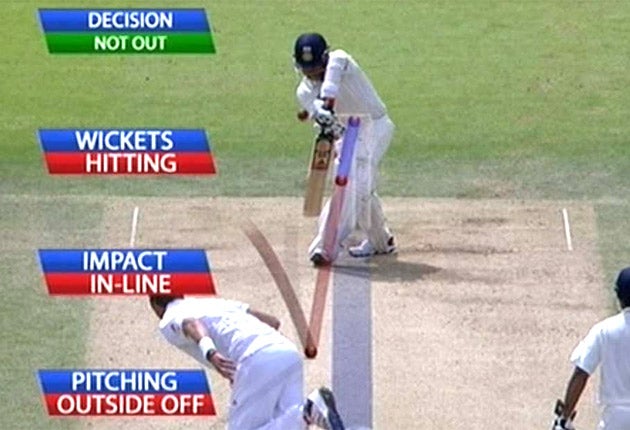DRS in the dock again after ICC orders investigation
More reviews could be made available

Your support helps us to tell the story
From reproductive rights to climate change to Big Tech, The Independent is on the ground when the story is developing. Whether it's investigating the financials of Elon Musk's pro-Trump PAC or producing our latest documentary, 'The A Word', which shines a light on the American women fighting for reproductive rights, we know how important it is to parse out the facts from the messaging.
At such a critical moment in US history, we need reporters on the ground. Your donation allows us to keep sending journalists to speak to both sides of the story.
The Independent is trusted by Americans across the entire political spectrum. And unlike many other quality news outlets, we choose not to lock Americans out of our reporting and analysis with paywalls. We believe quality journalism should be available to everyone, paid for by those who can afford it.
Your support makes all the difference.After a summer of constant debate, the future of the Decision Review System was cast further into uncertainty today.
The International Cricket Council decided more investigations were needed to ensure a foolproof operation and will set up a working party, the game's usual fall-back plan when no progress is being made.
DRS is no longer ICC official policy after India failed to back it and although it is still used in most series involving other countries, it was the object of much controversy during the summer's Ashes series.
The ICC's executive committee, at its meeting in Dubai, agreed action was needed after hearing a report from England and Australia. But it demonstrated merely that the procedure is far from perfect. Until India come on board, it hardly matters anyway.
There was, however, one positive move for those countries who continue to use the system. A trial will start next month – in time for the next Ashes in November – when each team's referrals will be topped up to two, the number with which they start, after 80 overs.
Tests will also be conducted on the snickometer, which it is hoped will complement Hot Spot, the technology at the centre of many of the summer's big talking points.
Umpires were given support after declaring their intention to deal more severely with gamesmanship. They will at last enforce the rules governing minimum over rates and time-wasting and be far more flexible in playing on in bad light.
The ICC said: "Members have confirmed their collective support for the international umpires and the spirit of the game, which under the Laws of Cricket requires that the umpire's decision be accepted without question."
The World Test Championship, to be played in 2017, will be officially launched in Dubai next month. India are again the fly in the ointment. They have declined to sign up to the Future Tours Programme which governs participation, putting the whole tournament in doubt.
What's new? ICC changes
* Reviews will be topped back up to two for each side after 80 overs of a Test innings.
* Endorsement for umpires to be stricter on poor over rates and time-wasting and maximise playing time when it is safe to do so.
* In an ODI reduced to 25 overs or less, prior to the start of the first innings, only one new ball will be used per innings.
* Current ODI playing conditions to remain unchanged, including provision for the use of two new balls per innings.
* Will investigate the development of a ball that can last the full 50 overs of a one-day innings.
Join our commenting forum
Join thought-provoking conversations, follow other Independent readers and see their replies
Comments